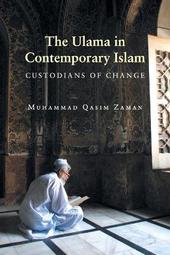
|
The Ulama in Contemporary Islam: Custodians of Change
Paperback / softback
Main Details
| Title |
The Ulama in Contemporary Islam: Custodians of Change
|
| Authors and Contributors |
By (author) Muhammad Qasim Zaman
|
| Series | Princeton Studies in Muslim Politics |
|---|
| Physical Properties |
| Format:Paperback / softback | | Pages:312 | | Dimensions(mm): Height 235,Width 152 |
|
| Category/Genre | Islam
Religious and spiritual leaders |
|---|
| ISBN/Barcode |
9780691130705
|
| Classifications | Dewey:297.61 |
|---|
| Audience | | Professional & Vocational | | Tertiary Education (US: College) | |
|---|
| Illustrations |
3 tables.
|
|
Publishing Details |
| Publisher |
Princeton University Press
|
| Imprint |
Princeton University Press
|
| Publication Date |
25 February 2007 |
| Publication Country |
United States
|
Description
From the cleric-led Iranian revolution to the rise of the Taliban in Afghanistan, many people have been surprised by what they see as the modern reemergence of an antimodern phenomenon. This book talks about the increasingly visible public role of traditionally educated Muslim religious scholars (the 'ulama) across contemporary Muslim societies.
Author Biography
Muhammad Qasim Zaman is Robert H. Niehaus '77 Professor of Near Eastern Studies and Religion at Princeton University. He is the author of "Religion and Politics under the Early Abbasids" and the editor, with Robert W. Hefner, of "Schooling Islam: The Culture and Politics of Modern Muslim Education" (Princeton).
Reviews"A detailed, carefully researched monographic study... Among other things, it demonstrates that the received image of Muslim clerics ... as passive, unworldly reactionaries bound to an atemporal, socially withdrawn Islam is thoroughly misconceived. In many places, by now perhaps most, they are seen as members of vanguard groups in the renovation of traditional Islamic society and belief."--Clifford Geertz, The New York Review of Books Muhammad Qasim Zaman [writes] ... with a magisterial command of both the internal discourses the ulama use among themselves and the dynamics of national and international developments. In addition, he builds his arguments with an extraordinarily rich mix of relevant examples, rarely seen and well referenced documentation, plus discerning support from other researchers, theorists, and commentators... Zaman offers what amounts to a new working definition of the ulama that locates them not at the edge but at the center of discussions charting the course of Islam in the next century."--Patrick Gaffney, American Historical Review "This book, a shining example of thorough and deliberate scholarship, forces us to re-evaluate commonly held misperceptions of the religious class and madrasa education more generally... With this unique volume, Qasim Zaman has finally provided something long missing in the field of Islamic studies: a comprehensive analysis of contemporary ulama as dynamic interpreters and producers of religious knowledge--and an analysis of the absolutely highest quality at that."--Peter Mandaville, International Sociology "Muhammad Qasim Zaman's book de-stereotypes the ulama, especially the view that they are inflexible in their attitudes, generally resistant to social changes, and, as a consequence, become redundant. He clarifies that the community of religious scholars that has existed in Muslim societies for more than a thousand years has also witnessed resurgence in contemporary Muslim societies."--Mohammad Talib, Journal of Islamic Studies "[An] excellent study... For those who wish to understand some of the ways Islam constitutes itself in the contemporary world, this persuasive study provides a well-argued and nuanced analysis of this aspect of contemporary Islam."--Library Journal "A very important and scholarly work ... this book shows how the Ulama have responded to the challenges of a rapidly changing world."--Choice "Muhammad Qasim Zaman dispels any notion of the homogeneity of Muslim thought in The Ulama in Contemporary Islam, a masterly study of the role of the 'ulama' in India and, after 1947, in Pakistan."--Mahmood Ibrahim, Bulletin of the Royal Institute for Inter-Faith Studies "With this book Muhammad Qasim Zaman has placed the modern 'ulama' squarely into the debates over the rise and appeal of Islamist movements... The book presents a well-documented exploration of the 'ulama' in the Subcontinent, and an important comparison of the modern 'ulama' of Egypt, Saudi Arabia, Pakistan, and India."--Richard McGregor, Islamic Studies
|